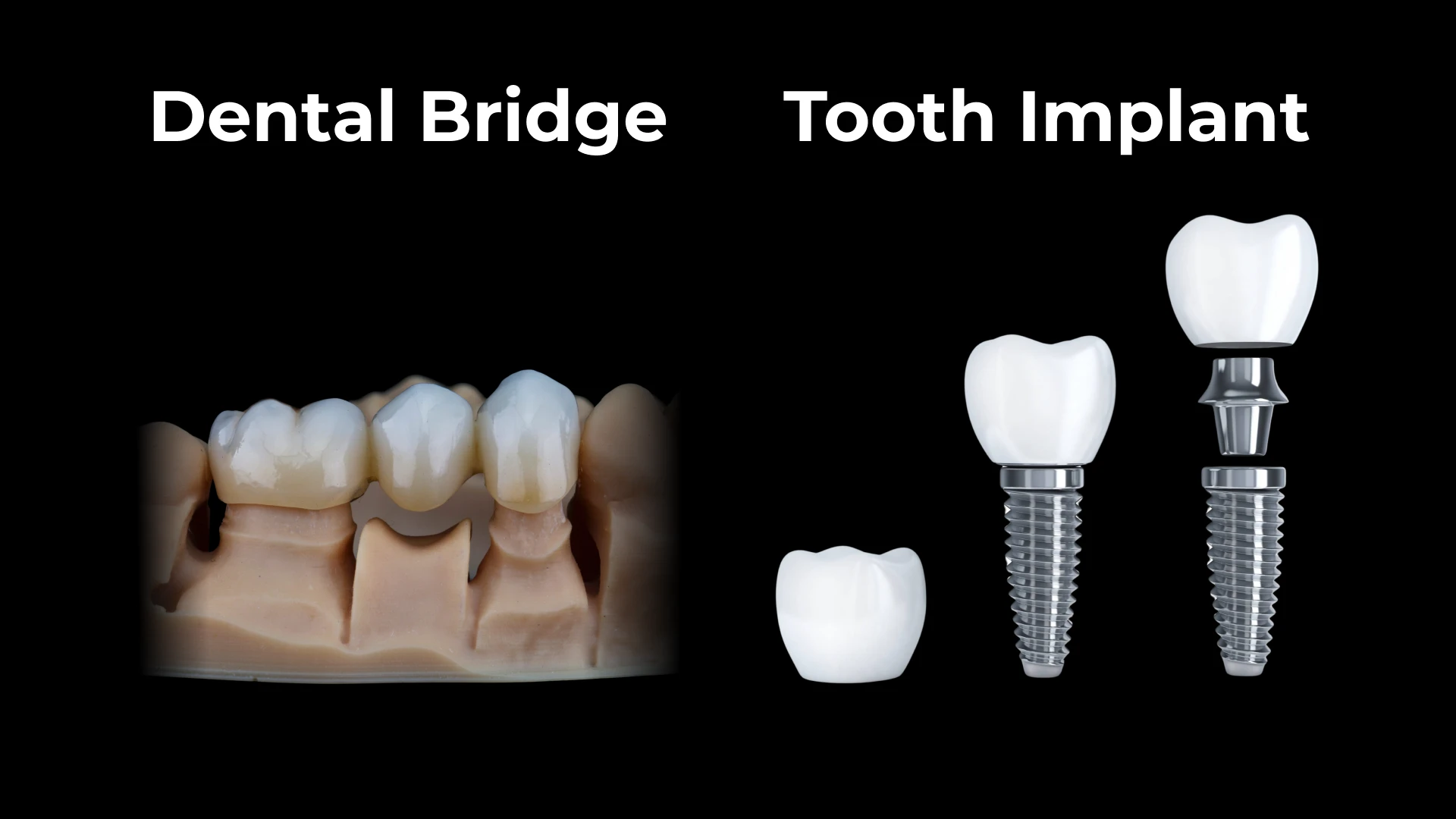Dental Bridge vs Implant: Which Tooth Replacement Option Is Right for You?
If you’re missing a tooth or know you’ll need a replacement soon, you’ve likely encountered two primary solutions: a dental bridge or a single tooth implant. Deciding between them can be confusing. Which option is more natural? Which one lasts longer? In the video above, Dr. Tyler J. Tolbert explains why understanding the core differences is key to making the best decision for your smile and long-term oral health.
This guide will break down the comparison of a dental implant vs bridge, exploring the pros and cons of each, to help you choose the right path for your specific needs.
What Is the Difference Between a Dental Bridge and an Implant?
Before weighing the pros and cons, it’s important to understand how each tooth replacement option works. Though both fill a gap in your smile, they do so in fundamentally different ways.
A dental bridge is a traditional prosthetic that uses the two teeth adjacent to the gap for support. To place a bridge, these neighboring teeth must be filed down and fitted with crowns. These crowns then anchor the artificial tooth (called a pontic) that “bridges” the empty space. This is often seen as a quicker fix.
A tooth implant, on the other hand, is a modern, standalone solution. It replaces the missing tooth root with a small titanium post surgically placed into the jawbone. A custom crown is then attached to this post. Because it is self-supporting, a dental implant does not affect the healthy teeth on either side of the gap.

Pros and Cons of a Dental Bridge
A dental bridge can be a viable solution in certain situations, particularly when speed is a priority. However, it comes with significant trade-offs that are important to consider. Here are the pros and cons of dental implants vs bridges when looking at the bridge option.
Pros of a Dental Bridge
- Faster Treatment: The entire process is usually completed in just two to three visits.
- Non-Surgical: Placing a bridge does not require a surgical procedure.
- Insurance Coverage: Bridges are more frequently covered by dental insurance plans.
Cons of a Dental Bridge
- Compromises Healthy Teeth: The biggest drawback is the need to permanently alter and grind down two potentially healthy teeth to support the bridge.
- Causes Bone Loss: A bridge does not stimulate the jawbone, which means the bone underneath the missing tooth will continue to erode over time.
- Shorter Lifespan: Bridges typically last about seven to ten years before needing replacement, which often requires further reduction of the supporting teeth.
- Difficult to Clean: It can be challenging to clean underneath the pontic, which increases the risk of food traps and decay on the supporting teeth.
The Modern Gold Standard: Pros and Cons of Dental Implants
Dental implants are widely considered the gold standard for replacing missing teeth due to their longevity, durability, and health benefits. They are designed to mimic a natural tooth from root to crown.
Pros of a Single Tooth Implant
- Preserves Natural Teeth: As a standalone solution, it does not impact or require altering the adjacent healthy teeth.
- Maintains Jawbone Health: The implant post integrates with the jawbone, stimulating it during chewing to prevent bone loss.
- Superior Durability: Implants are built to last and can function for 15 to 25 years, or even a lifetime, with proper care.
- Looks and Feels Natural: An implant functions just like a real tooth, and most patients report that their brain can’t even tell the difference.
- Easy to Maintain: You can brush and floss an implant just like you would a natural tooth.
Cons of a Single Tooth Implant
- Higher Upfront Investment: The dental bridge vs implant cost can be a factor, as implants may have a higher initial price.
- Requires Healing Time: The process involves a minor procedure and a healing period of two to four months before the final crown is placed.
A Quick Side-by-Side: Dental Bridge vs Implant
If you’re still weighing your options, this direct comparison can help clarify the key differences and help you decide which solution aligns best with your long-term goals.
| Feature | Dental Bridge | Dental Implant |
|---|---|---|
| Timeline | Completed in 2-3 visits | 3-5 months from start to finish |
| Impact on Nearby Teeth | Requires grinding down healthy adjacent teeth | Standalone; does not affect adjacent teeth |
| Bone Preservation | Does not prevent bone loss underneath | Stimulates and preserves jawbone structure |
| Cleaning & Maintenance | Can be difficult to clean; potential food trap | Cleaned just like a natural tooth |
| Average Lifespan | 7-10 years | 15-25 years or even a lifetime |
| Long-Term Cost | Lower upfront cost but requires future replacement | Higher upfront investment but often more cost-effective over time |
Making an Informed Choice at Smile Now
So, when it comes down to a dental bridge vs implant, which is better? The answer depends on your priorities. If your primary concern is speed and a simpler, short-term fix, a dental bridge may be suitable. However, if your goal is longevity, optimal oral health, and natural performance, a dental implant wins every time.
At Smile Now, we believe in helping you make an informed decision, not a one-size-fits-all recommendation. We offer free consultations to evaluate your needs with 3D imaging, review your options, and discuss your goals, lifestyle, and budget. If you choose a tooth implant, the entire process is handled in-house, from imaging and placement to the final crown. You will work directly with one doctor every step of the way to receive a custom-fit, long-lasting solution.
If you’re ready to take the next step, contact us today to schedule your free consultation. Let’s work together to find the best solution for your smile, your health, and your future.


